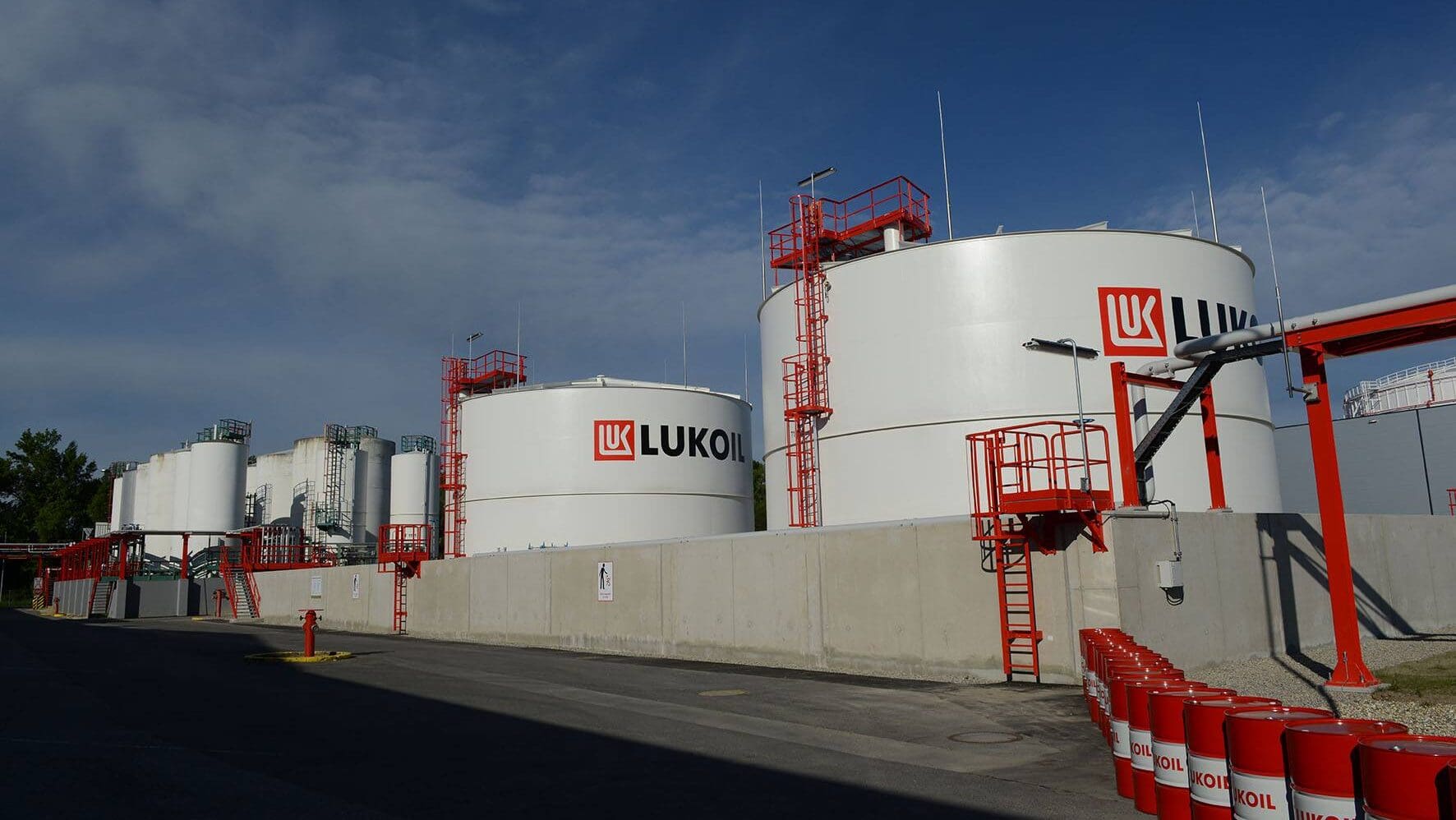
Lukoil oil storage tanks.
Photo: Lukoil on Facebook, 26 April 2016
The European Commission will step in as a mediator in the spiraling Lukoil dispute after Ukraine halted the Russian company’s crude oil transit through its territory, seriously jeopardizing the energy security of two EU countries, Slovakia and Hungary.
As we reported before, Kyiv’s unilateral decision to sanction the non-state-owned Lukoil—despite the company’s relative distance from the Kremlin and good standing in Brussels—has caused outrage in Slovakia and Hungary, the two countries most reliant on pipeline oil coming through Ukraine.
Lukoil provides around 35% of Hungary’s entire oil supply, and 40% of the processing supply of Slovakia’s largest crude oil refinery plant, Slovnaft. Halting this transit—especially after both countries have been aiding Ukraine’s war effort with regular diesel deliveries since the beginning of the war—is “both incomprehensible and unacceptable,” Hungarian foreign minister Péter Szijjártó commented, while Slovak PM Robert Fico said his country won’t be a “hostage” to the Russian-Ukrainian relations.
❌FM Péter Szijjártó: Ukraine's decision to not allow Lukoil to transit oil supplies through Ukraine poses a fundamental threat to the security of energy supplies to Hungary and Slovakia.
— Zoltan Kovacs (@zoltanspox) July 22, 2024
🛑 This is an unacceptable and incomprehensible move by a country that wants to become a… pic.twitter.com/Q6dLAthQv5
The two countries have requested that the Commission intervene in the dispute by launching a consultation procedure under the EU-Ukraine Association Agreement, which it acknowledged and agreed to on Tuesday, July 23rd.
“We are currently studying the contents of this letter and gathering more information before taking any decision,” a Commission spokesman said, adding that the EU executive “stands ready to support the impact on member states and find a solution together with Ukraine.”
Then, as a sign that perhaps the issue is not much of a priority in Brussels, however, he also downplayed the potential consequences: “At the moment, there is no immediate impact on the security of oil supply to the EU.”
Looking at it from Brussels, the issue may indeed seem minor, but not so much in landlocked Central Europe. Seaborne Russian oil has been banned in the bloc for some time now, while most member states stopped buying pipeline oil as well. Slovakia and Hungary, together with Czechia, are the only three countries that were given an opt-out due to their overreliance on Russian pipeline oil.
“The EU sanctions, which we have disputed on several occasions, and which in this case have again been shown to have a greater negative impact on Slovakia and the EU than on Russia itself, clearly state that Slovakia has an exemption for oil imports until the end of the year,” Slovak Foreign Minister Juraj Blanár said in his statement. “The Ukrainian side has prevented us from exercising this exemption.”
Blanár highlighted that restricting the Lukoil supplies and therefore endangering the energy security of EU countries is a “clear violation” of the EU-Ukraine Association Agreement. “It is strange that a country aspiring to be integrated with the EU is seriously jeopardizing the energy supplies of two member states,” Szijjártó noted, echoing his Slovak colleague.
Under said agreement, the consultation procedure is supposed to find some form of solution in three days. If that doesn’t happen, the parties can request a ruling from an ad hoc arbitration court made up of three members that are appointed by Brussels and Kyiv together. If they can’t agree on the composition of the court, its members will be selected at random from a 15-person list put together by the EU-Ukraine trade committee.
In other words, it might be a very short—or a very long—process, depending on the actual willingness of the European Commission to help. And then there’s the question of whether Kyiv would even accept the outcome. If it doesn’t, that could in theory lead to the suspension of other elements of the Association Agreement, but that’s a whole new procedure that also depends on the Commission’s ability to stay neutral, which is unlikely, given the two sides.
Neither Slovakia nor Hungary can wait for long, especially not during the summer peak consumption period. Budapest, therefore, is trying to hasten the process by raising the stakes. “As long as this issue is not resolved by Ukraine, everyone should forget about the payment of the €6.5 billion of the European Peace Facility compensation for arms transfers,” Szijjártó said on Tuesday, referring to blocking a portion of the funds meant for reimbursing member states for their military aid sent to Ukraine.
As a temporary measure, Bulgaria agreed to supply additional oil products to Hungary on Wednesday, July 24th. “Bulgaria has been a reliable transit country, respecting all its obligations,” Szijjártó said after meeting Sofia’s energy minister, Vladimir Malinov. “This offer of assistance from Bulgaria is another beautiful and genuine gesture of friendship.”
🇧🇬🤝🇭🇺 FM Szijjártó: "Bulgaria has offered to help Hungary manage the difficulties caused by Ukraine's oil transit ban on Russian Lukoil, demonstrating another act of true friendship."
— Zoltan Kovacs (@zoltanspox) July 24, 2024
🛢️ Following discussions with Bulgarian Energy Minister Vladimir Malinov, FM Szijjártó… pic.twitter.com/0MQva2XFOl
